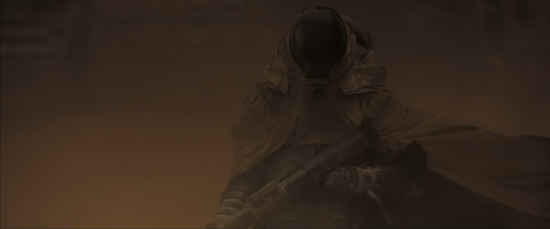There's a scene close to the beginning of Denis Villeneuve's interpretation of Dune that's probably made the hearts of sci-fi nerds of a certain age and over skip a beat.
 |
| All it's missing is a Jim Burns signature along the bottom. |
This comes after a glimpse of a strikingly armored sci fi guard, and accompanies a an equally lyrical description of the planet Arrakis and its struggles. I am, Villeneuve is saying, one of you guys. He probably is: even if you don't take his results at face value, he'd been talking about this as a passion project from a long time back, and you just know he had to fight to get people to finance it.
This adaptation is a staggering achievement - a faithful reconstruction of a novel that was long considered impossible to bring to the screen (I'm actually OK with David Lynch's attempt, but it just reinforced that image). James Herbert's 1965 novel is dense with ideas, a soft science fiction epic that focuses on society, politics and religion with remarkable originality and complexity. It's weirdly paced, truly bizarre (admittedly, it gets weirder on the sequels), and features loads of info-dumps and internal dialog.
Given all of this, it's no wonder that Lynch failed - what surprises me is how close he got to succeeding, behind-the-scenes drama and all. And now comes Villeneuve, and makes a movie that not only towers over Lynch's effort, it's also much more faithful to the source material.
It's crazy that this isn't even Villeneuve's best sci-fi film.
The story concerns the machinations of an empire eight millennia into the future, when humanity has spread into the stars, carrying its cultures and religions to all sorts of different worlds. The planet Dune, properly called Arrakis, is vital to the empire as it is the sole source of Spice, a sort of space dope that starship pilots can use to properly chart courses among the stars. At the beginning of the story, the emperor changes the noble family in charge of exploiting the planet - from the dastardly Harkonnens to the noble house Atreides.
(And anyone who knows a little Greek mythology will groan at that name; They might as well fly to dune on a ship called Icarus, and call their first colony Roanoke).
There's other players in the drama: There's the Fremen, native (well, you know what I mean) to Arrakis and in a state of almost constant insurrection, and the Bene Geserit, an all-female illuminati-style order with mystical powers. The film first centers on the attempts of House Atreides to peacefully consolidate their position in the planet, and then on what happens when some pretty non-peaceful Harkonnens come knocking... and the fallout from their invasion. There's a 'chosen' one narrative where the heir to House Atreides is at the center of an ancient prophecy, but just like in the book it's clear that the prophecy has been carefully seeded to manipulate events from the shadows.
It's a busy, busy film, one that expects you to learn all sorts of funky terminology, keep track of multiple threads, and take a bunch of weird concepts in stride. The way Villeneuve manages it is by splitting the novel into two halves, of which this is the first one. It was a risky maneuver - what would have happened if the first movie didn't find an audience? - But one that thankfully paid off. The extra breathing room allows Villeneuve and his co-writers (Eric Roth and Jon Spaihts) to lavish the planet and far future societies with attention, and a whole lot of talented people spent untold amounts of money bringing Herbert's word to the screen as organically as possible.
 |
| Seriously, that introduction... |
The effects and artistic vision are amazing, and the production design - wardrobe, vehicles, buildings - is top-notch, intricately detailed and with an impressive sense of scale. Action-wise it's good; The surprisingly prevalent hand-to-hand fights are just OK (and they sure make a whole lot of noise about those shields for them to matter very little in the end), but I haven't seen any other movie where lasers seem so fucking dangerous as they do here, and there are a lot of extremely cool-looking explosions. Everything looks, as you'd expect from this particular director, absolutely incredible.
The acting is all shades of great, with strong central performances from Oscar Isaac, Timothée Chalamet and Rebecca Ferguson, and excellent turns by names like Josh Brolin, Stellan Skarsgård, Dave Bautista, Javier Bardem, and Jason Momoa.
As good as it is, the film does stumble in a few areas. I'm not a fan of the sound mix - Hans Zimmer's (excellent but bombastic) score overpowers everything else, leaving some of the action weirdly low-impact. The script also struggles finding a cutoff point; The movie has a clear ending, but it plows through it and continues for yet another hour, leaving the events of this last third feeling inconsequential, despite being well-integrated into the story. The film's climactic confrontation, for example, is based on someone's unwillingness to kill - which might well be very relatable, but as a concern it comes out of nowhere, so the stakes aren't too compelling. Especially with everything that went on before.
And a little too much is made of the mystical visions, which don't really pay off meaningfully.
Yet. I suspect that these last two issues will become a moot point once the movie is completed with Part Deux. After all, as someone cheekily says as the last line in the movie: this is only the beginning.
I'm just hoping they succeed... just to see how the hell they adapt Dune Messiah, which is a properly freaky (and pretty boring) book.
No comments:
Post a Comment